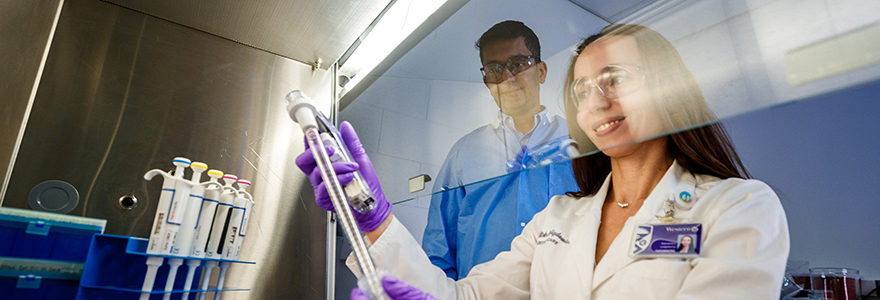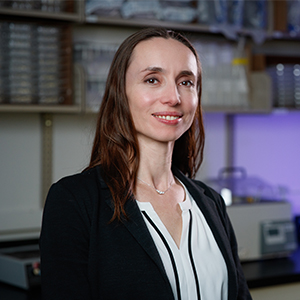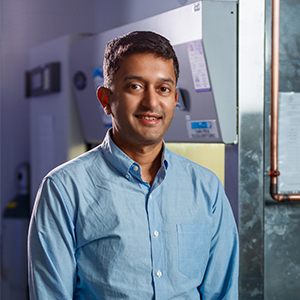Robarts scientists combine unique talents to help patients

By Communications
Drs. Aleksandra Leligdowicz and Mark Chandy have brought their globally recognized talents to Robarts Research Institute at Schulich School of Medicine & Dentistry to tackle some of the major medical challenges of our time.
The pair were recruited to the Department of Medicine at Schulich Medicine from California in 2021, and are intent on translating their complementary areas of research in heart disease and severe infection from the lab to the patient, while sharing a singular passion for helping patients and families.
Leligdowicz, who came to Schulich Medicine from the University of California, San Francisco, is a critical care physician and a recipient of the Wolfe-Western Fellowship. She has focused her career on understanding infectious diseases, such as sepsis and COVID-19 to improve patient therapies and outcomes. Chandy, most recently from Stanford University, is a cardiologist and the Barnett-Ivey Heart & Stroke Chair who has made contributed significantly to understanding heart disease and diabetes. The doctors have been married for six years and have three children together, and though their personal lives are intertwined, their dream of fusing their research together is only now coming to life at Western University.
 Dr. Aleksandra Leligdowicz’s research aims to develop personalized treatment options for critically ill sepsis patients.
Dr. Aleksandra Leligdowicz’s research aims to develop personalized treatment options for critically ill sepsis patients.
Finding a common thread
Chandy intimately understands the need for cardiovascular disease research.
“Having a family history of cardiovascular disease piqued my interest in this specialization at a young age and motivated me to find answers,” he said.
For Leligdowicz, interactions with the families of critically ill patients fuel her desire to develop innovative treatment options for sepsis, which are currently very limited. Septic shock is a life-threatening condition that happens when a patient’s blood pressure drops to a dangerously low level after a severe infection and results in the failure of multiple organs, such as the heart, lungs, and brain. Treating septic shock requires a specialized team in the intensive care unit.
“It’s extremely difficult to explain to a patient’s family when their loved one is severely ill that, although some therapies may be beneficial to treat septic shock, we don’t know how to precisely offer treatments to the patients who will respond best. The research in this area is lacking,” said Leligdowicz.
 Dr. Mark Chandy’s research will examine how major environmental risk factors affect cardiovascular health.
Dr. Mark Chandy’s research will examine how major environmental risk factors affect cardiovascular health.
Cellular research to the rescue
The aim of translational research is to move discoveries into clinical practice quickly and effectively. Chandy and Leligdowicz have combined their research to better understand underlying biological reasons for complex syndromes, such as heart disease and sepsis, and discover targeted therapies using novel tools such as regenerative medicine (the process of regenerating human cells to restore or improve function).
While it may be difficult to comprehend how their two distinct patient areas of focus can benefit from their shared research, it comes down to induced pluripotent stem cells (iPSCs).
iPSCs can reveal how to target novel and existing therapies for patients in septic shock. At the same time, investigating iPSCs can also improve our understanding of how cardiovascular health is affected by environmental risk factors, such as e-cigarettes, marijuana, air pollution and opioid use.
iPSCs can generate a limitless supply of an individual's endothelial cells (that line the inside of the heart) and the blood vessels that become injured during severe sepsis. Chandy and Leligdowicz plan to generate iPSCs from blood samples from consenting septic patients. These iPSCs will be used to test responses to novel and existing therapies.
Their hope is to discern some of the molecular factors that contribute to endothelial cell injury during severe sepsis and reveal how therapeutic options can be tailored to fit different patients and ultimately create better outcomes.
Moving forward together
Drs. Chandy and Leligdowicz felt palpable excitement when they first arrived at Western from sunny California in 2021.
“Everybody at Robarts and Western is very collaborative and enthusiastic about our research,” said Leligdowicz. “As a scientist, there is nothing more thrilling than being in an environment where people are interested in your work, and knowing that your research has the potential to improve lives.”
Setting up their shared laboratory space at Robarts will see the couple officially working together for the first time. It’s very exciting for the sought-after pair, who understands research of this magnitude is not possible without the support of a strong community committed to discovery.
“We are ecstatic to have recruited outstanding young scientists like Drs. Leligdowicz and Chandy to Robarts to establish their translational research programs,” said Robert Bartha, Vice-Dean, Research and Innovation, at Schulich Medicine. “Their combination of talents and innovative research direction will help find new treatments for these devastating diseases. It’s a real win to have them here.”








